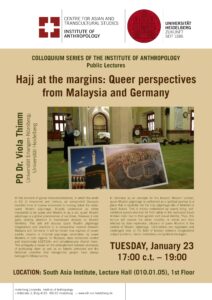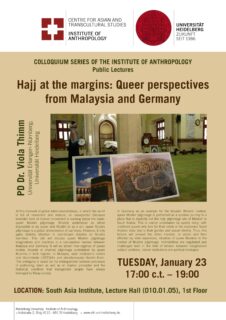Lecture by PD Dr. Viola Thimm: ‘Hajj at the margins: Queer perspectives from Malaysia and Germany’
Our staff member PD Dr. Viola Thimm gives a lecture about ‘Hajj at the margins: Queer perspectives from Malaysia and Germany’ on Tuesday, 23rd of January 2024 at the University of Heidelberg.
Abstract:
At this moment of global interconnectedness, in which the world is full of movement and mixture, an unexpected (because invisible) form of human movement is running below the radar: queer Muslim pilgrimage. Broadly understood as either impossible to be queer and Muslim or as a sin, queer Muslim pilgrimage is a global phenomenon of our times. However, it only gains sketchy attention in mainstream debates on Muslim identities. This talk will discuss queer Muslim pilgrimage imaginations and practices in a comparative manner between Malaysia and Germany. It will be shown how regimes of power enable, impede or channel pilgrimage undertaken by queer Muslims in both regions. In Malaysia, state institutions control and discriminate LGBTQIA+ and simultaneously cherish them. This ambiguity is based on the entanglement between processes of politicizing Islam as well as on Islamic principles and the historical condition that transgender people have always belonged to Malay society. In Germany as an example for the broader Western context, queer Muslim pilgrimage is performed as a spiritual journey to a place that is explicitly not the holy pilgrimage site of Mekkah in Saudi Arabia. This is mainly undertaken by openly living, self-confident queers who fear for their safety in the repressive Saudi Arabian state due to their gender and sexual identity. Thus, this lecture will present the either invisible, or visible and then affected by state repression, situation of queer Muslims in the context of Muslim pilgrimage. Im/mobilities are negotiated and challenged here in the field of tension between marginalized subject positions, Islamic institutions and political
ideologies.”


